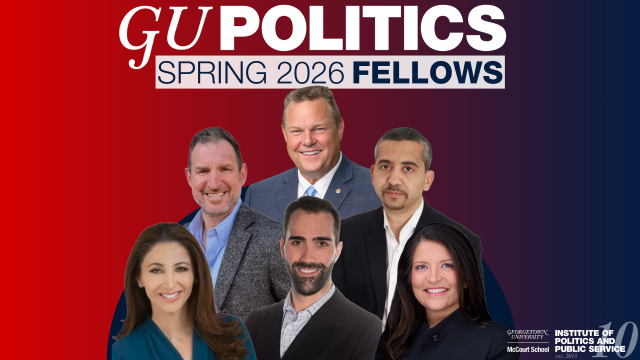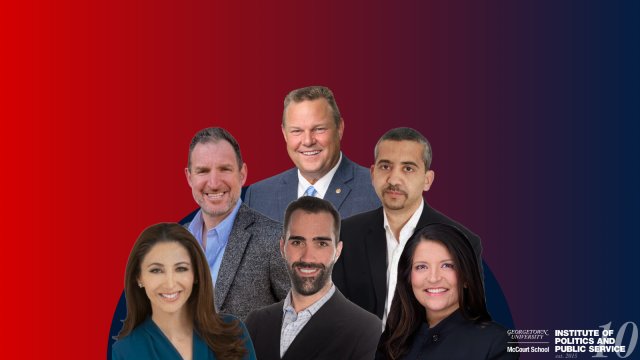Title: New Battleground Civility Poll: 72% of Voters Feel Personal Values Under Attack
Voters Send Mixed Message on Need for Compromise, While Overwhelmingly Calling for More Respect and Civility in Politics.
WASHINGTON, D.C. – With the potential of a government shutdown looming over Washington, a new national poll sheds light on the challenge facing lawmakers seeking a compromise.
According to the latest Georgetown Institute of Politics and Public Service (GU Politics) Battleground Civility Poll, which has been tracking voter attitudes towards political polarization since 2019, voters seem to be sending mixed messages to lawmakers about the importance of compromise. While 83% of respondents agree (54% strongly) that compromise and common ground should be the goal for political leaders, an equal number (82% overall, 54% strongly) agree that they are tired of leaders compromising their values and ideals and want leaders who will stand up to the other side.
Further underscoring the apparent contradiction, 76% of voters (48% strongly) believe that their side has already compromised enough on the issues most important to them, while 71% (31% strongly) agree that they think it is ok for their side to compromise a little more if it means getting something done.
Even as this contradiction cuts across party lines, there is still a partisan divide. While voters across parties feel that compromise should be a goal of leaders (85% of Democrats and Independents, 81% of Republicans), Republican voters are more likely to say they are tired of leaders compromising on their values by a 13-point margin (89% vs 76% of Democrats and Independents). Similarly, Republicans are more likely to say their side has compromised enough and it’s time for the other side to give a little (81% vs nearly three-quarters of Democrats and 65% of Independents), and are less likely to say it is okay for their side to compromise a little more to get something done (59% vs 83% of Democrats and 67% of Independents).
“Voters seem to be saying, ‘Of course I want you to find common ground. As soon as you come over to where I’m standing, we’ll be on common ground,” said Mo Elleithee, Executive Director of the Georgetown Institute of Politics and Public Service. “Most Americans agree that compromise should be the goal, as long as their beliefs aren’t the ones being compromised. These results echo much of what we’re seeing in our discourse now, and highlight just how tough of a balancing act it is for even the most skilled politicians.”
Strong Majorities Believe Personal Values Under Attack
The poll, conducted by GOP polling firm The Tarrance Group and Democratic firm Lake Research Partners, also showed that more than seven in ten voters believe that their personal values are under attack in our current culture. And while that reflects strong majorities across parties, there once again is a partisan divide with Republicans (90%) much more likely to believe their personal values are under attack than Democrats (58%) or Independents (60%).
Voters Pessimistic About Level of Political Division
Voters have become slightly more pessimistic about the level of political division in the country. When asked to rate the level of political division in the country on a scale from 0 to 100 where 0 is no division and 100 is division on the edge of a civil war, the mean response is 72.9 (up from 71 in November 2022). When asked to predict the level of division one year from now, the mean response increases to 73.65 (up from 68.4 in November 2022).
“Woke” Culture and Government in Schools
As culture war issues continue to be discussed on the presidential campaign trail, the poll shows that a majority of voters in the survey perceive “woke culture” to be a problem, but politicians controlling what is being taught in schools is seen as a far more serious issue.
Fifty-six percent of voters agree that woke culture is a problem with 41% viewing it as a serious problem, while 37% of voters disagree that woke culture is a problem and 25% of voters disagree strongly. While a majority of voters do hold this view, this concern is very much driven by conservatives. Among centrist voters, a majority (54%) agree that this is an issue. However, on the ideological poles, fully 91% of very conservative Republicans think this is a serious problem while fully 81% of very liberal Democrats do not think this a problem.
More than eight-in-ten voters (88%) agree that politicians trying to control what is being taught in school is a serious problem. This is clearly an issue where voters on both sides of the political spectrum think the other side is trying to influence educational policy. Groups ranging from Republicans (89%), Independents (88%), Democrats (86%), conservatives (88%), moderates (89%), liberals (87%), and even parents (92%) and non-parents (87%) think this is a serious problem.
Respect in Leaders and Institutions
When asked about certain institutions and individuals, respondents provided the following feedback on whether they had a lot, some, a little, or no respect for them:
- Only the U.S. Military garnered a majority of respondents sharing they had “a lot” of respect at 67%. 86% of Democrats, 88% of Independents, and 97% of Republicans said they had a lot or some respect for the military.
- By contrast, Social media companies underperformed all other institutions by a large margin, with a whopping 69% of respondents saying they had little/no respect for those companies. 35% of those respondents stated they had no respect for social media.
- 50% of respondents said they had “a lot” or “some” respect for President Biden, while 43% gave the same response for Former President Trump. Unsurprisingly, these were driven sharply along partisan lines with only 13% of Republicans saying they had a lot/some respect for President Biden and only 5% of Democrats saying they had a lot/some respect for former President Trump.
- Congress also remains underwater with just 48% of respondents saying they had a lot/some respect for the institution, while the Supreme Court fared better with 58%.
- Despite being thrust into the middle of recent political arguments, criminal justice and judicial institutions still enjoy majority respect. Law enforcement rates second highest (behind the military) with an 84% respect rating. The U.S. Justice System as a whole rates 64%, while the Supreme Court receives the respect of 58%. It is notable that Independents are closely aligned on the two institutions at 59% and 57% a lot/some respect for U.S. Justice System and Supreme Court respectively, while Republican and Democrats have a strong divide. Democrats hold the the U.S. Justice System in a much higher regard, at 70% to Republicans’ 58%, whereas Republicans view the Supreme Court much more favorably at 81% compared to Democrats’ 37%
- Partisan divide remains apparent between the parties with 58% of respondents having a lot/some respect for members of the Democratic party and 51% for members of the Republican party. This was fiercely drawn along partisan lines, with each party securing 87% and 85% of their respective respondents having a lot/some respect for their self assigned party, but only 27% of Republicans polled felt a lot/some respect for Democrats while just 18% of Democrats polled felt a lot/some respect for Republicans.
A Path Forward Through Respect, Civility, and Results
Despite the mixed messages on compromise and voter pessimism over political division, they do give a few clear messages to leaders on how to work through polarization.
- Respect. 94% of voters (72% strongly) agree that “Respect for each other is the first step in having a government that works.”
- Civility. 89% of voters (59% strongly) agree that “Civility is the language of respect.”
- Results. By a two to one margin, voters prefer “a politician who is willing to work together to get things done, even if it means compromising on my values sometimes” (67%) over “a politician who consistently fights for my values, even if this means not finding a solution very often.” (31%)
“While voters may believe that the country is going in the wrong direction, the vast majority of Americans want to see their elected officials compromise to get things done, believe respect is the first step to achieve this, and are mostly willing to sacrifice some of their personal values sometimes to achieve this goal,” said Celinda Lake of Lake Research Partners. “We need politicians to show the same willingness to restore the values of respect and civility and figure out what we can agree on. As we approach the 2024 presidential election, politicians have a choice to better work together to avoid the intense division of the past.”
“The hit musical Hamilton features a poignant moment when President George Washington urges Alexander Hamilton to work with his political opponents to find a solution on a significant policy issue. Washington offers the maxim that “winning was easy…governing is harder”. What follows is Hamilton negotiating the real life compromise that among other things brought Washington, DC into existence. Hamilton gets much of what he wants and indeed much of the strength of our modern economy is due to his foresight,” said Ed Goeas of The Tarrance Group. “Political leaders in this city created by this compromise and leaders across the country would do well to follow Hamilton’s example. It can be frustrating and challenging to be civil and respectful and to seek compromise with one’s adversaries, but the good policy outcomes and the electoral goodwill created by these actions will be more than worth the initial struggle.”
ABOUT THE POLL
The most recent Georgetown University Institute of Politics and Public Service Battleground Civility Poll was conducted among 800 registered, likely voters nationwide between September 10th – 14th, 2023 and has a margin of error of 3.5%. The poll was conducted by Republican pollster and former GU Politics Fellow Ed Goeas and Brian Nienaber of the Tarrance Group, and Democratic pollsters Celinda Lake, Daniel Gotoff, Sandra Markowitz, McCauley Pugh, Ronan Ferrentino, and Lina Tate of Lake Research Partners.
The poll is made possible by the generous support of American Policy Ventures, a 501(c)(3) organization dedicated to reducing polarization through more productive policy dialogue across party lines.
To learn more about the poll, see the questionnaire, charts, tables, and analysis visit: https://politics.georgetown.edu/battleground-poll/
Academics, researchers, and journalists can also access the full dataset to assist in their own research and analyses. [Note: Any use of this data and material must credit the Georgetown Institute of Politics and Public Service Battleground and Civility Poll.]
The Georgetown Institute of Politics and Public Service Battleground Civility Poll is a national bipartisan survey measuring political opinion among registered voters in the United States. Produced by Republican strategist Ed Goeas of The Tarrance Group and Democratic strategist Celinda Lake of Lake Research Partners, this polling series offers unique polling analysis and insights from two top pollsters from different sides of the aisle.
Initiated in June 1991, and housed at GU Politics since April 2019, the Battleground Polls have gained widespread media recognition as reliable bellwethers of national opinion and voters’ intentions. The Battleground data projected the outcome of the 1992, 1996, and 2004 presidential race more precisely than any other similar effort in the country, including those of the major TV networks and national newspapers. In addition, Battleground Polls have consistently been major predictors of what is going to happen in approaching Congressional elections.
With the GU Politics partnership, a Civility Poll was introduced in 2019 to track voter attitudes about polarization in politics.
ABOUT THE INSTITUTE OF POLITICS AND PUBLIC SERVICE
The Institute of Politics and Public Service (GU Politics) connects and empowers students and the broader community to improve and reimagine politics and public service and reaffirm its promise. Founded as part of the McCourt School of Public Policy in the fall of 2015, GU Politics programming is open to the entire Georgetown community.
ABOUT AMERICAN POLICY VENTURES
American Policy Ventures is a national nonprofit organization dedicated to funding, building, and launching projects that have the potential to foster cross-partisan collaboration, strengthen the fabric of our democracy, and help policymakers get things done on the big issues facing our country. Founded in the spring of 2023 by Liam deClive-Lowe and Paolo Mastrangelo, APV works to leverage research — like the Battleground Civility Poll — to help policymakers understand the root causes of polarization and forge new pathways to achieving results.
More News

As we hit the halfway point of our 10th anniversary year, we are excited to introduce the Georgetown Institute of Politics and Public Service (GU Politics) Spring 2026…

GU Politics is thrilled to announce a new member joining our Advisory Board. Izzy Klein (C’99) will join a board of public servants, political…
